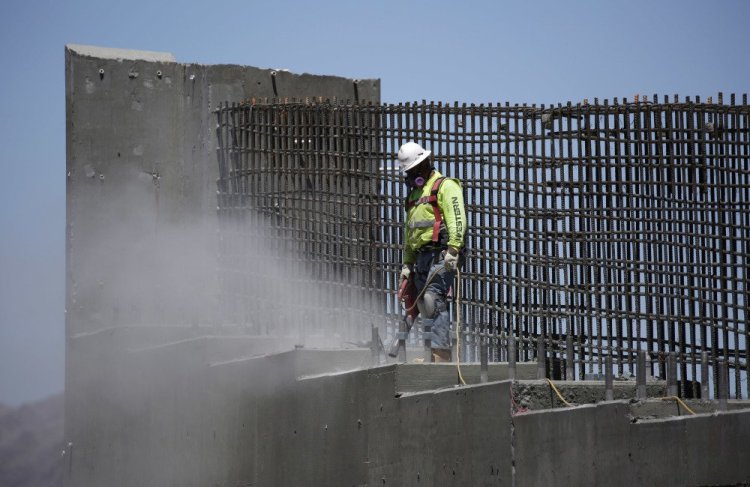If there is one opportunity for bipartisanship in an extremely hyperpartisan Washington, it probably would be infrastructure, which is uniquely situated at the top of the priority list for Democrats and President Trump.
But the time to talk infrastructure is upon us, and, predictably, both sides are traveling down completely different roads. If Trump and the Democrats can’t figure out how to work together on this – well, it’s a fair question to ask whether they can work together on anything.
Things were rosier a few months ago. Trump said on the campaign trail that he wanted to invest about $1 trillion over a decade to rebuild U.S. roads, bridges and waterways. Hey, so do we, Democrats said. Maybe there’s at least one thing we can work together on. (Republicans are generally not a fan of big government spending and big government projects.)
Trump will spend this week outlining his infrastructure priorities. But some of what he’s proposed is the exact opposite of what Democrats say they can support.
On Monday, Trump proposed a plan to privatize air traffic control, which, he says, is “stuck painfully in the past.” Not all Democrats oppose this idea, but many progressives say it’s unnecessary and will hand too much power to corporations.
The same dynamic could play out later this week, when Trump will go to Ohio and Kentucky to outline more of his infrastructure spending priorities. We don’t know what he’ll say, but if his proposals match up to his budget – which proposes cutting infrastructure programs in favor of private investment – he will have crossed the one red line congressional Democrats have drawn.
Democrats say any infrastructure rebuilding must be funded mostly by the government instead of private corporations, which they don’t trust to make decisions in the public’s best interest.
And just like that, the most promising initiative for bipartisan compromise will have crumbled, perhaps irreparably.
Actually, it’s already crumbling.

House Minority Leader Nancy Pelosi, D-Calif., said in a statement, “Trump’s ‘infrastructure week’ appears to be little more than a Trojan Horse for undermining workers’ wages and handing massive tax breaks to billionaires and corporations.” Associated Press File Photo/Jacquelyn Martin
Here’s House Minority Leader Nancy Pelosi, D-California, in a statement this week: “Trump’s ‘infrastructure week’ appears to be little more than a Trojan Horse for undermining workers’ wages and handing massive tax breaks to billionaires and corporations.”
“I’m not expecting a lot, because you can just tell on the way he’s framing this,” said Rep. Ted Lieu, D-California, a member of the Congressional Progressive Caucus and the author of a resolution of the 10 must-haves for an infrastructure plan Democrats would support. (I’ll save you a click: Privatizing highways doesn’t make the top 10.) “If his lead item is privatizing air traffic controllers, that tells me he doesn’t have an infrastructure plan.”
This isn’t just a story about infrastructure. It’s a story about Democrats and the president using a shared priority to build trust and a working relationship with one another. At the lowest moments in his presidency, Trump has seemed amenable to that idea.
After House Republicans’ first health-care bill collapsed in March, Trump floated the idea of working with Democrats instead.
Maybe, said those same Democrats in Congress. But first Trump will need to change pretty much everything about himself – his tone, substance, policy – since he became president.
Democrats saw a glimmer of a promise in Trump’s campaign rhetoric – he was critical of free trade deals, he was supportive of more taxes on the wealthy, and even at one point, he was open to a universal health-care system.
Since then, what little trust there was between the two sides has completely deteriorated as Democrats watched the president drop his populist streak and choose the hard-right wing of his party.
“I remember President Trump’s election night speech,” Lieu said, “where he focused on two issues: veterans and infrastructure. And I thought: ‘I could work with that.’ Unfortunately, that’s not what he did. He came into office and basically tried to jam down the Muslim ban, and that caused all Democrats to go to DEFCON 5.”
Senate Minority Leader Charles Schumer, D-New York, said on ABC at the time, “He moved so far to the hard right that it’s virtually impossible for us to work with him.”
The battle is raging on both sides. Trump regularly accuses Senate Democrats of launching all-out war on approving his Cabinet nominees. (Although in a tweet Monday, Trump blamed Democrats for not approving nominations to positions to which he hasn’t even nominated people.)
Rebuilding infrastructure offered a momentary break in the incessant fighting and a rare chance for Democrats and Trump to recalibrate their nearly nonexistent relationship.
But in its early stages, infrastructure looks less like a unicorn of an issue – one capable of bringing political enemies together – and more like the status quo: an issue that’s bitterly divided on partisan lines.
In other words: Welcome to Washington, infrastructure reform.
Send questions/comments to the editors.



Success. Please wait for the page to reload. If the page does not reload within 5 seconds, please refresh the page.
Enter your email and password to access comments.
Hi, to comment on stories you must . This profile is in addition to your subscription and website login.
Already have a commenting profile? .
Invalid username/password.
Please check your email to confirm and complete your registration.
Only subscribers are eligible to post comments. Please subscribe or login first for digital access. Here’s why.
Use the form below to reset your password. When you've submitted your account email, we will send an email with a reset code.